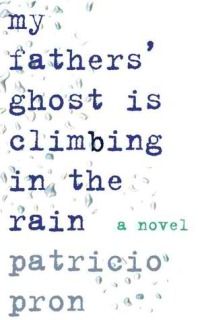My Father's Ghost is Climbing in the Rain by Patricio Pron
 Wednesday, May 22, 2013 at 11:53AM
Wednesday, May 22, 2013 at 11:53AM 
Published in Spain in 2011; published in translation by Knopf on May 21, 2013
We are told that the events described in My Father's Ghost is Climbing in the Rain are mostly true. We're also told that the novel's narrator (unnamed in the text, but I'll give him the author's first name since he claims to be telling us his own story) is unreliable. He warns the reader that his words can be taken either as truth or invention since he is incapable of distinguishing one from the other.
Patricio is a journalist who has an uneasy relationship with the truth. Entire years are missing from Patricio's memory, so it's fitting that some chapter numbers are missing from My Father's Ghost -- chapters skipped over, like the chapters of the narrator's life -- while other chapter numbers are out of sequence or repeated, presumably reflecting Patricio's scattered thoughts. Patricio blames the gaps in his life on the medications his psychiatrist was dispensing, drugs that made him feel like he was "floating in a pool without ever seeing its bottom but not being able to reach the surface." The reader soon discovers, however, that Patricio's memory loss is a form of self-protection. Patricio grew up in Argentina, "a country called fear with a flag that was a face filled with dread." The terrors of life during Argentina's rule by a military dictatorship are best forgotten, but the novel is about Patricio's compulsion to remember.
After eight years in Germany, Patricio returns to Argentina to say goodbye to his father, who is languishing in a hospital bed. In his father's study, he finds a folder labeled Alberto Burdisso. Its contents describe a simple-minded man who has disappeared from El Trébol, the city where Patricio spent part of his childhood. Burdisso had been awarded reparations for his sister's disappearance three decades earlier, money that led to his death. As Patricio reads through the file's contents, he learns that the city he believed to be idyllic is in fact sordid, sullied, and sad.
Patricio takes us through the file, document by document. His investigation of the file becomes an attempt to find his father "in his last thoughts." In this, Patricio is like other Argentinians of his generation, solving their parents' pasts like detectives, "and what we were going to find out would seem like a mystery novel we wished we'd never bought." Yet literature is a "pale reflection" of, and cannot do justice to, the beliefs and ideals of his father's generation. In real life, unlike novels -- and particularly in Argentina during the 1970s -- mysteries go unsolved, crimes go unpunished, and the world outside the book is not "guided by the same principles of justice as the tale told inside."
Not surprisingly, in searching for his father Patricio begins to find himself. He comes to realize a truth: "You don't ever want to know certain things because what you know belongs to you, and there are certain things you never want to own." At the same time, he becomes convinced that he needs to tell the story of his father's generation because their ghost "was going to keep climbing in the rain until it took the heavens by storm."
All of this is an excellent premise for a novel. Patricio Pron nearly pulls it off, but in the end, the excellent story he tells is just too slim to attain such a lofty goal. What we learn about the father is fragmentary (intentionally so, given the novel's structure) and superficial. The narrator tells us that "what my parents and their comrades had done didn't deserve to be forgotten," but we learn very little about their struggle. At the same time, Patricio shares few of his recovered memories with the reader. The novel ultimately reads like a preface to a greater story that needs to be told, but it isn't told here.
That isn't to say that I disliked the story Pron tells. There are some stunning sentences in My Father's Ghost, the kind that make you pause and reread them two or three times. Not all of My Father's Ghost works (a series of brief chapters that describe Patricio's fever dreams add nothing to the story), but through most of the novel, Pron's intense prose is riveting. Viewed as a slice of life, the beginning of a journey yet to be completed, this small novel is quite rewarding.
RECOMMENDED
Reader Comments